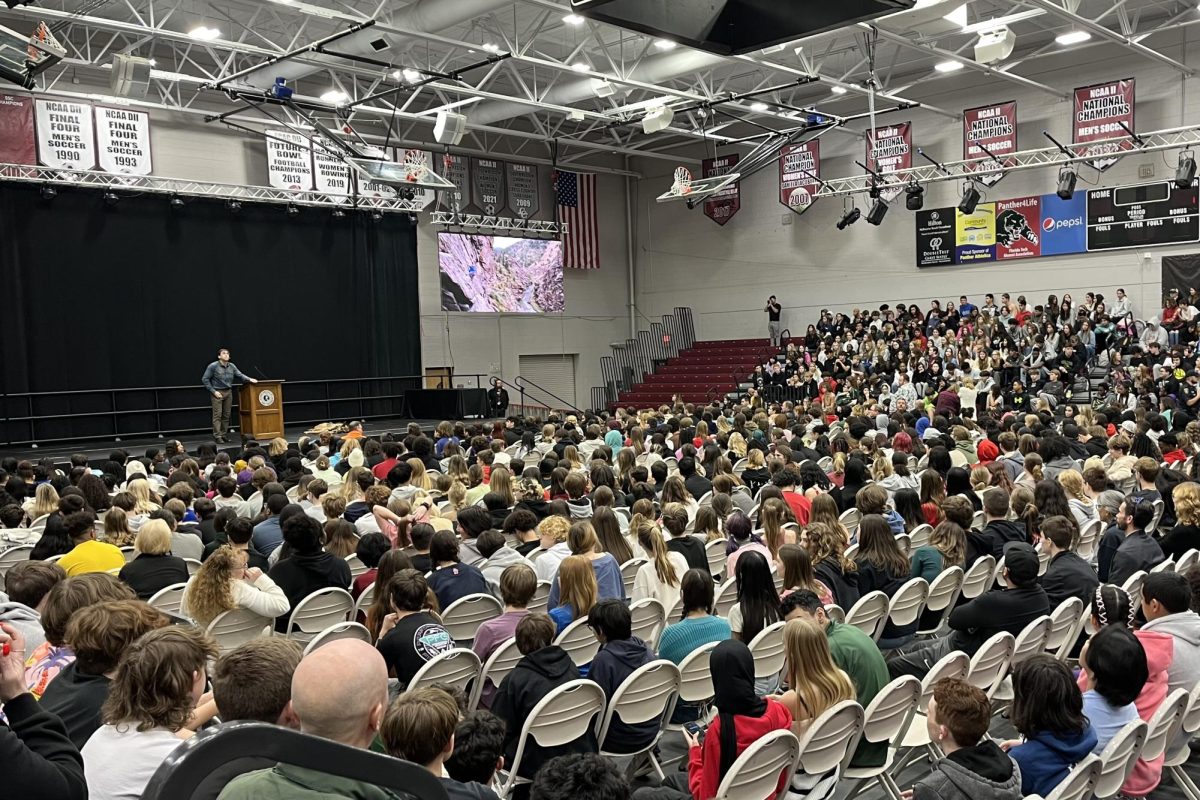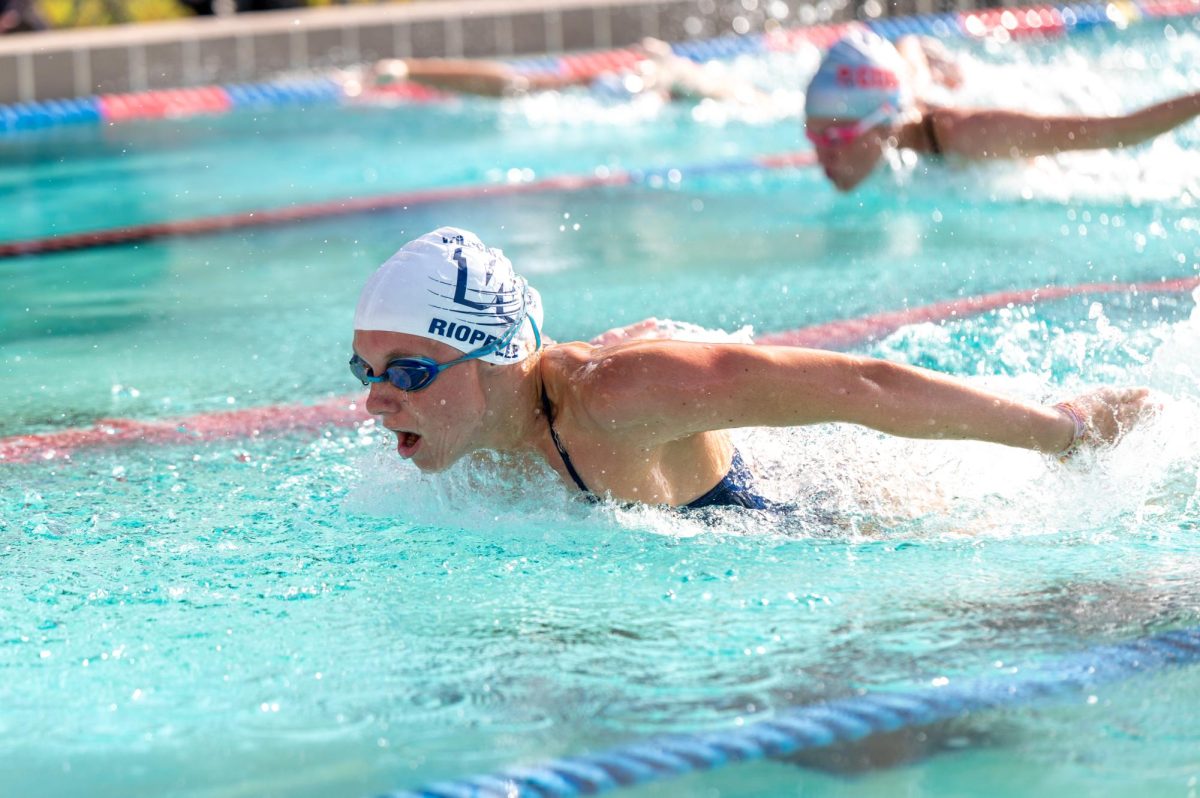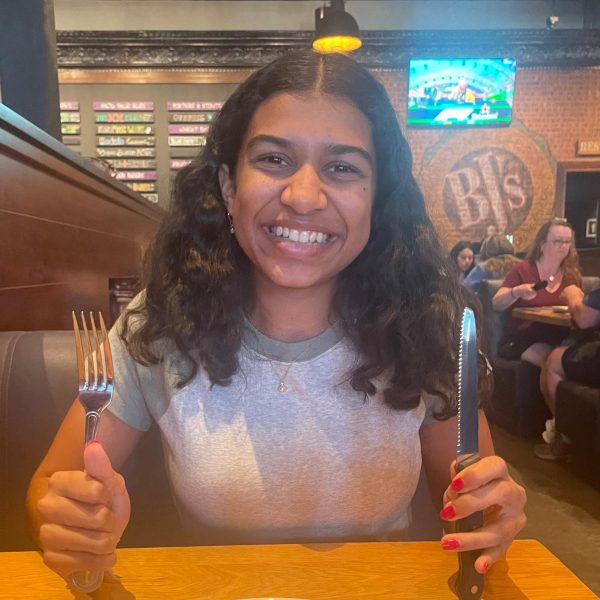Superintendent Mark Rendell was looking for a speaker to motivate school administrators for the school year when he remembered the story of Erik Weihenmayer, which he had heard six years prior. Weihenmayer lost his vision when he was thirteen and later went on to accomplish notable feats, including becoming the first blind person to summit Mount Everest. Rendell reached out to Weihenmayer to invite him to attend the annual Superintendent Summit in July, which all school administrators in the county attend.
“I wanted him to come speak to our principals — to be a motivational uplifting speaker and get us ready for the year,” Rendell said. “But he kept saying, ‘Well, I want to talk to the kids. I want to talk to young people.’”
Weihenmayer spoke at the Superintendent Summit on July 20 and later presented to ninth grade students from all of the Brevard public high schools at the Florida Institute of Technology on Jan. 30.
In a virtual interview with the “Roar” staff following his presentation, Weihenmayer said that he wanted the presentation to have a lasting impact on the mindsets of students.
“I get asked to speak at a lot of schools,” Weihenmayer said. “As a speaker, you come in and you give a really cool presentation and everyone’s inspired, but then there’s no traction. People go home and within a week, they’ve forgotten it, and they’re back to the same patterns and same thoughts.”
Before Weihenmayer’s visit, every ninth grade student was issued a copy of his book “No Barriers.” The story was a personal account of Weihenmayer’s journey to kayak 277 miles across the Grand Canyon in 2014. The books were distributed in the students’ English classes along with a lesson plan for the teachers. Weihenmayer said he thinks this plan was helpful to instill the message of the book into the students.
“I think as a speaker, you’re trying to create that whirlpool effect where those messages just keep compounding and being reinforced,” Weihenmayer said. “I think the best way to do that is what the freshmen did; they read the book; they talk about it; they have activities; they really think about it for a long period of time. Then the speaker comes, and he or she is like the icing on the cake. There’s a much greater chance that those ideas are going to take root in your individual minds and in your friendships and in your culture.”
One obstacle in distributing the books to students was that it was not on an approved book list. The book needed to be screened and approved by the community for use at the ninth grade level. Additionally, acquiring funding for copies of the books for every ninth grade student posed another challenge. Rendell said that the books were funded by a nonprofit organization.
“We don’t have a lot of money for extra books and things like that, so we actually went to the Brevard Schools Foundation,” Rendell said. “That’s a separate nonprofit that raises money and does things for us to supplement what we do. We went to them, and when I was explaining this project to them, they were in the process of applying for a resiliency grant, and they’re like, ‘Hey, we can use this money in this resiliency grant to pay for the books.’”
Assistant Principal Glenn Webb was in charge of organizing the field trip for West Shore students. Webb said that freshmen were chosen as the age group to attend the presentation because they are at a pivotal point in their lives.
“The jump from middle school to high school is a huge leap forward,” Webb said. “They might already have some academic accelerations, but the expectations at high school are very different. You’re setting your college transcript; you’re focused on the end now. From the day you walk into high school, you’re focused on the end. Coming in, it’s a daunting task and personally, I think that’s a perfect time for the message of ‘look, this is not supposed to be easy,’ and that’s a good thing.”
Forty-five percent of the ninth grade class from each high school in Brevard was enabled to attend the presentation in person.
“We wanted to reach every ninth grader,” Rendell said. “There’s about five-and-a-half thousand ninth graders. There’s no facility in Brevard County big enough to put all the ninth graders in, so the idea was that we would send some kids from every school live to the event and then every other kid would be able to watch it on the livestream. That made it tougher for us, like more logistics. I felt like every school needs to have some kids there. That meant we ran 60 buses.”
Webb used a random generator to select 45 students and invited the selected students via email to attend the field trip. The ninth grade English teachers also attended the presentation as chaperones.
Freshman Landon Plechaty watched the livestream of the presentation in the auditorium. He said he was confused by the fact that the presentation differed from the content they learned in class.
“When he was talking, it didn’t apply to the book we read at all because he was talking about something completely different,” Plechaty said.
However, Weihenmayer said that he intentionally made the subject of his presentation diverge from his book.
“I thought, ‘You know, the students have already read that,’” Weihenmayer said. “They’ve read all about the Grand Canyon. My presentation might just be retelling the stories that they’d already read about, so what could I do that’s different? What could I tell them that they don’t know? I thought I’d do something new and different that they hadn’t heard about.”
Freshman Artemis Theodoropoulos attended the presentation in-person. She said that she enjoyed the field trip and that it met her expectations as a learning experience.
“I learned that it takes courage to overcome setbacks and that you can definitely accomplish a lot with a little,” Theodoropoulos said.
Rendell said that Weihenmayer’s presentation is important in helping students develop mental strength.
“We talk a lot about mental health and struggles that young people have, especially coming out of the pandemic,” Rendell said. “We want young people to have this motivation, the skills and the tools to overcome adversity. [Weihenmayer] can help deliver that message of ‘you can overcome almost any struggle before you,’” Rendell said. “Here’s a blind person who’s climbed Mount Everest. Whatever troubles we may have, as significant as we think they might be, we can overcome them.”
Weihenmayer said that the main takeaway he wants students to receive from the presentation is that progress comes from stepping out of your comfort zone and experiencing failure.
“If you think you’re ever going to get past doubt and fear, then it’s just an unrealistic goal,” Weihenmayer said. “Most of us have doubts. Most of us, throughout our lives, are walking on a knife edge. One side is fear and darkness, and on [the other] side is adventure and fulfillment. You’re straddling that knife edge, and when you face a daunting goal, you’re moving forward into that uncertainty, and that’s the way most of us are going to feel. I want people to understand that and be realistic about it — that despite those feelings, you can move forward and do big things or live that fulfilling life.”











































